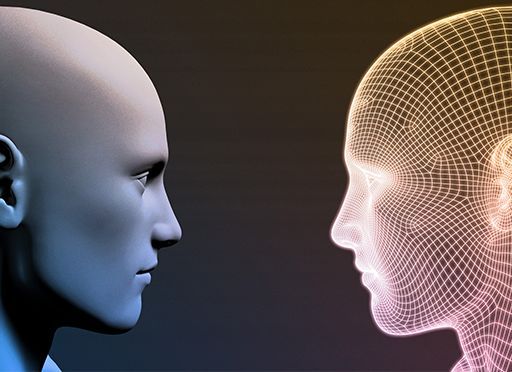Yuval Noah Harari

Author, historian and public intellectual Yuval Noah Harari teaches at the Hebrew University of Jerusalem. He’s a noted author of several books including bestsellers Sapiens: A Brief History of Humankind, Homo Deus and 21 Lessons for the 21st Century.
He runs Sapienship, a multidisciplinary organization focused on technological disruption, nuclear threats and ecological collapse with co-founder Itzik Yahav.
Photo: Dirk-Jan Visser/laif
1. Yuval Noah Harari’s Key Findings and Messages
- Language set Homo sapiens apart from others and paved the way for extensive collaboration.
- Shared stories based on national identity, religion, laws and money created coherent societies.
- Humanity has the technological capability to shape the future for better or worse.
- As the technological revolution displaces workers and fractures formerly shared myths, humankind needs to find new stories that preserve the human sense of meaning.
2. Why Do They Matter?
Yuval Noah Harari’s best-selling book Sapiens: A Brief History of Humankind laid out a sweeping view of human history starting with a “cognitive revolution” approximately 70,000 years ago. The development of language gave Homo sapiens an edge over Neanderthals and other Homo species and enabled the growth of large societies. Over time, due to the agricultural and scientific revolutions, humans now have near-godlike control over their environment. In Homo Deus, Harari examined the current technological revolution and how genetic engineering and artificial intelligence (AI) might enable a future of “human design” rather than natural selection. What happens when algorithms know individuals “better than they know themselves?” How can humans be manipulated with this data? Who has the right to that information? Will the rapid automation of the world’s industries create a jobless “useless class?” Harari argues what is most at stake is humankind’s sense of meaning. Harari’s books have been translated into 65 languages and have sold more than 40 million copies worldwide. He founded Sapienship with his husband Itzik Yahav to focus on the social impact of the world’s most pressing challenges.
3. To Understand Harari’s Work, Start Here
Harari published Sapiens: A Brief History of Humankind in 2011, based on his world history lectures at Hebrew University of Jerusalem.
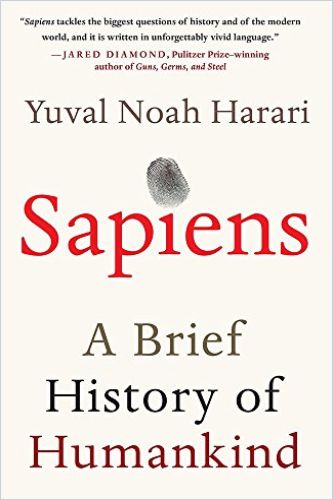
Highlights:
- Homo sapiens succeeded due to a mix of happenstances: the development of language which facilitated socialization, a curious nature, technological ability and a desire to trade.
- “Shared myths” such as nations, religions, laws and money enable coherence among people.
- Scientists can reengineer people with computer implants and prostheses that interact with the brain. This evolving “superhuman” may be as different from modern humans as Neanderthals.
- Increasing happiness is a measurement of human progress. The problem with humans developing “superhuman” artificial intelligence (AI) is it may not value human happiness.
- Learn more…
Both scientist and conqueror began by admitting ignorance – they both said, ‘I don’t know what’s out there.'”
Yuval Noah Harari
4. Practical and Quick Insight
Harari went on to write additional books about human nature, AI and the consequences of extreme technological disruption in the bestsellers Homo Deus in 2016 and 21 Lessons for the 21st Century in 2018:
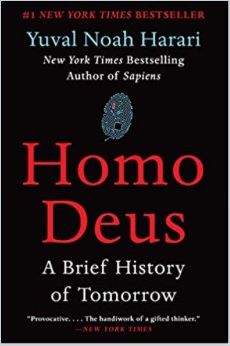
- Humans don’t actually have free will and consciousness is an illusion.
- Having raised themselves above the animals, humans now strive to become immortals.
- As humans build artificial intelligence, they increasingly shift decision-making to data-collecting algorithms.
- Humans risk becoming irrelevant.
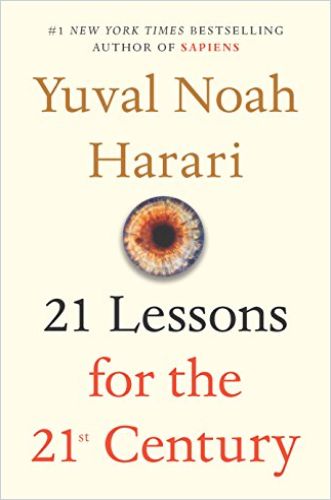
- Individual rights, free will and voting underpin liberal democracies, however people make decisions from their feelings not their thoughts.
- Eventually info- and biotech will combine to read your emotional state and whoever has this data can manipulate you.
- Limit the time you spend on your devices and become more aware of the world around you.
If the future of humanity is decided in your absence, because you are too busy feeding and clothing your kids, you and they will not be exempt from the consequences.
Yuval Noah Harari
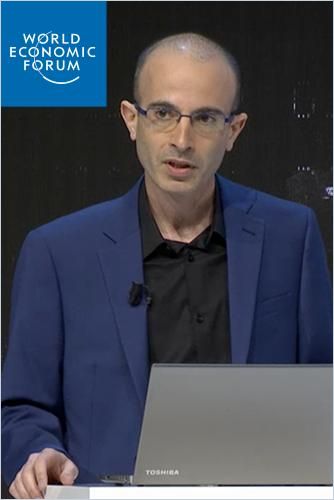
- Whether they possess the wisdom, humans will soon possess the tools to dictate future evolution.
- Data collected from individuals will enable humans to be “hacked.”
- Humanity’s future will be shaped by whoever controls the data.
- Data must be regulated but not by politicians, who’ve mostly demonstrated no interest in the future welfare of humankind, but rather by a mix of scientists, artists, thinkers and lawyers.
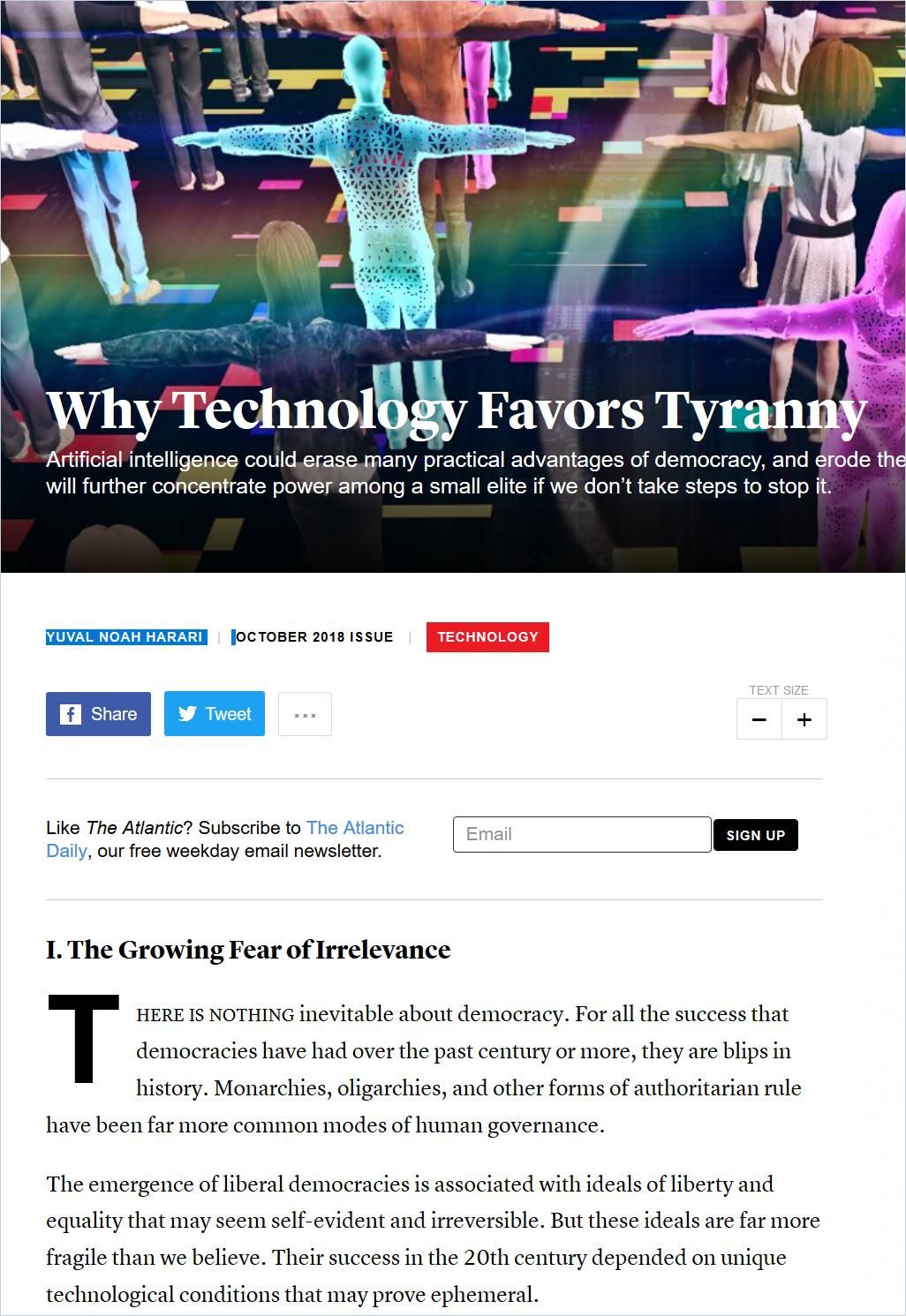
- Liberal democracies promote decentralized power and freely flowing information, which aids innovation and prosperity.
- AI makes centralized data collection and analysis more efficient and powerful, so authoritarian regimes gain a competitive edge, since they don’t care about privacy.
- Data regulation, making decentralized systems more efficient and empowering people to trust their judgment over machines will protect democracy.
People still have different religions and national identities. But when it comes to the practical stuff – how to build a state, an economy, a hospital or a bomb – almost all of us belong to the same civilization.
Yuval Noah Harari
5. Evaluate the Details:
Harari’s biggest concerns are technological disruption, the threat of nuclear war and ecological collapse.
In a 2021 conversation facilitated by tech journalist Kara Swisher, Harari discusses the historical repercussions of massive and rapid digital transformation with Nobel prize-winning behavioral economist Daniel Kahneman:

Daniel Kahneman and Yuval Noah Harari in Conversation
Nexus Israel Virtual Summit- AI may learn emotional intelligence, based on pattern recognition, but it won’t develop emotions.
- Surveillance and data collection at scale means algorithms that “know you better than you know yourself.”
- Money corrupts politics and governments aren’t improving their ability to remedy inequality.
- The world needs better stories about the power of technology to help people.
- Even dramatic change can evolve peacefully, but depends on education.
In a March 2022 conversation for the Nexus Israel summit, former US presidential candidate and entrepreneur Andrew Yang and Harari discuss technological disruption, prudent public policy, sustainability and what the future of work looks like:
- Technologies threaten the physical survival of all forms of life, but they also threaten humanity’s sense of meaning.
- AI and machines compete with humans in physical, mental, creative and even emotional dimensions, which means that many different kinds of jobs – even high-pay specializations like doctors – can conceivably be replaced by automation.
- High-touch caregiving jobs will be harder to replace.
- No one can predict the best way to prepare for even the near future, which makes it hard to educate people for them.
- For those who cannot access education or keep reinventing their careers, governments will need to step in, perhaps with Universal Basic Income policies, to “protect people, not protect jobs.”
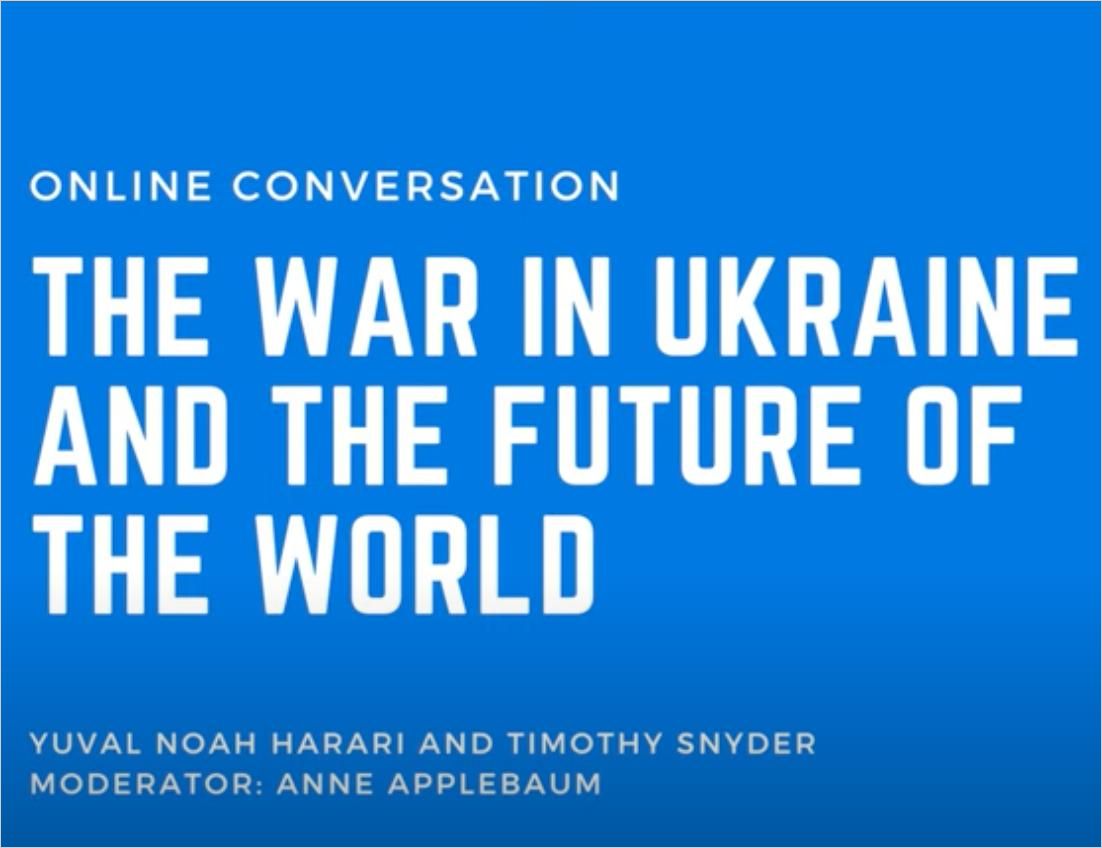
- Putin declared Ukrainians would greet Russian tanks with flowers. Instead, they greeted his invasion with Molotov cocktails and fight fiercely for their sovereignty.
- A large, aggressive country invading a neighbor means democracy around the world and world order in place since 1945 is in peril.
- Russia is also planting “seeds of hatred for generations” which will blossom in future conflicts.
- Ukraine needs military and humanitarian aid to combat Russia, while the world should keep tightening sanctions against Russia and Putin.
In an April 2022 interview with CNBC, Harari warns about the danger to world peace :
- The world needs to think wisely about “winning the peace” by supporting Ukrainian democracy rather than changing Russia.
- Nuclear war is once again a possibility, though unlikely.
In this TED Talk, Harari pinpoints just how meaningful a small, non-disruptive investment in climate change would be:
- It will cost just an additional 2% of global GDP above 2020 rates to prevent the most catastrophic effects of climate change.
- For the United States, this number comes to $1.7 trillion.
- The money will fund investments in clean energy technologies and infrastructure, such as storing and distributing solar energy.
- This will stimulate innovation and new jobs.
To save the environment, we don’t need to completely derail the economy or to abandon the achievements of modern civilization. We just need to get our priorities right.
Yuval Noah Harari
6. Additional Resources by Topic
- Modern fascism is seductive – In his 2018 TED Talk “Why Fascism is so tempting – and how your data could power it,” Harari appeared as a hologram and expanded on his themes of the misuse of data collection:
Highlights:
- Modern fascism won’t look like it did in the 1930s; many will see it as beautiful.
- Centralized data-collecting was a bug in 20th-century fascist systems, but now may be a feature.
- Only by understanding their own weaknesses can humans protect themselves.
- Believe it or not, your Humanities degree will still be relevant when AI takes your job – Harari joins in a 2018 World Economic Forum conversation about how AI will disrupt the workforce. While many workers will lose jobs, new jobs will be created. Employers will still want the diverse experience that comes with non-technical degrees. They will still rely on independent thinkers and problem-solvers on the job.
- On meditation – Harari credits his 15 years of Vipassana meditation practice with giving him the focus and clarity he needed to write his books. He says, “I think the most important benefit of meditation is to get to know the most ordinary daily natural patterns of your mind and of your body. To get to know your anger, your pain, your joy, your boredom because this is what you have to deal with in life.”
- Beware of those who call you a guru – Harari has passionate fans as well as vehement critics, but he rejects the label of guru because, he says, when people cling to gurus they quit trying to understand things themselves. He says about leadership, “We have this cult of the authentic leader…very very dangerous. They say whatever pops into their minds. I don’t want authentic leaders. I don’t want authentic politicians. I want responsible leaders and politicians.”
- Authors who have similar ideas and represent the same values:
If humans can be humble enough to realize they are vulnerable to hacking and manipulation, they can use that understanding to employ technology to build a better world.
Yuval Noah Harari
7. Deep Dive: Digital Transformation and the Future of Work
Find out more about Harari’s main topic in our related Journal articles:
About Our Thought Leader Profiles
Biographies can be found on Wikipedia. What you find here are instant practical insights into the thinking of important contemporaries. With the necessary references to the summaries of their works at getAbstract, of course.





